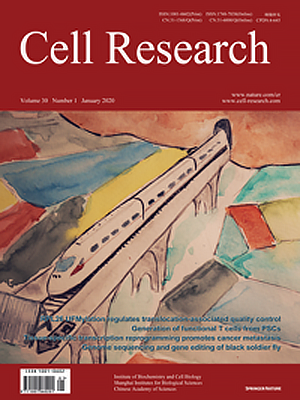
Advanced Search
Submit Manuscript
Advanced Search
Submit Manuscript
Volume 30, No 1, Jan 2020
ISSN: 1001-0602
EISSN: 1748-7838 2018
impact factor 17.848*
(Clarivate Analytics, 2019)
Volume 30 Issue 1, January 2020: 21-33 |
Rongqun Guo 1,2,3,5,6, Fangxiao Hu 1,2,5,6, Qitong Weng 1,2,3,5,6, Cui Lv 1,2,5,6, Hongling Wu 1,2,5,6, Lijuan Liu 1,2,4,5,6, Zongcheng Li 7,Yang Zeng7, Zhijie Bai 7, Mengyun Zhang 1,2,4,5,6, Yuting Liu 1,2,5,6, Xiaofei Liu 1,2,4,5,6, Chengxiang Xia 1,2,3,5,6, Tongjie Wang 1,2,5,6,Peiqing Zhou 1,2,3,5,6, Kaitao Wang 1,2,4,5,6, Yong Dong 1,2,5,6, Yuxuan Luo8, Xiangzhong Zhang8, Yuxian Guan 1,2,5,6, Yang Geng 1,2,4,5,6, Juan Du 1,2,3,5,6, Yangqiu Li 9, Yu Lan 9, Jiekai Chen 1,2,3,4,5,6, Bing Liu 7 and Jinyong Wang 1,2,3,4,5,6
1 State Key Laboratory of Experimental Hematology, CAS Key Laboratory of Regenerative Biology, Guangzhou Institutes of Biomedicine and Health, Chinese Academy of Sciences, Guangzhou, China; 2Guangzhou Regenerative Medicine and Health-Guangdong Laboratory (GRMH-GDL), Guangzhou, China; 3University of Chinese Academy of Sciences, Beijing, China; 4Joint School of Life Sciences, Guangzhou Institutes of Biomedicine and Health, Guangzhou Medical University, Guangzhou, China; 5Guangdong Provincial Key Laboratory of Stem cell and Regenerative Medicine, Guangzhou Institutes of Biomedicine and Health, Chinese Academy of Sciences, Guangzhou, China; 6Institute for Stem Cell and Regeneration, Chinese Academy of Sciences, Beijing, China; 7State Key Laboratory of Proteomics, Translational Medicine Center of Stem Cells, Fifth Medical Center, General Hospital of PLA, Beijing, China; 8Department of Hematology, the Third Affiliated Hospital of Sun Yat-Sen University, Guangzhou, China and 9Key Laboratory for Regenerative Medicine of Ministry of Education, Institute of Hematology, School of Medicine, Jinan University, Guangzhou, China
https://doi.org/10.1038/s41422-019-0251-7